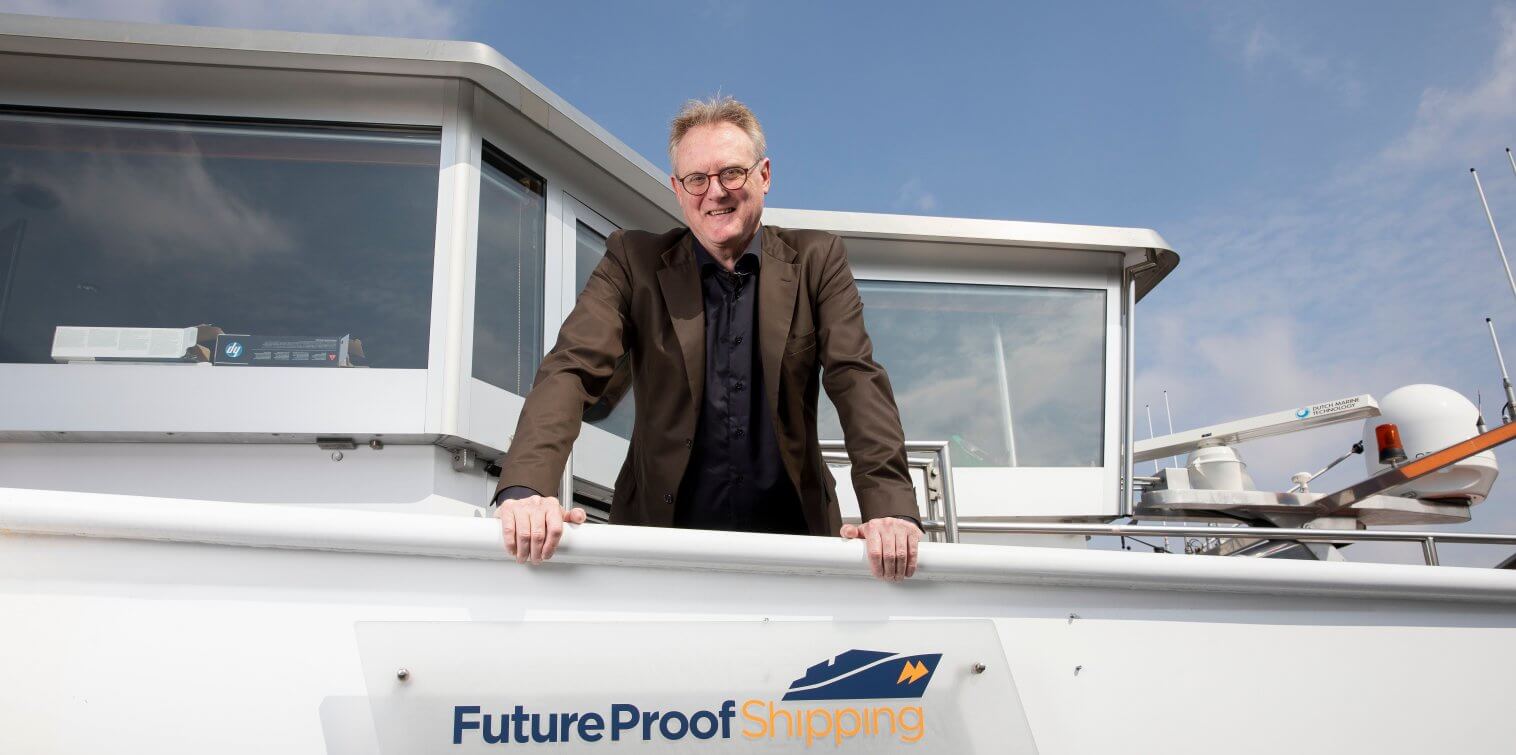‘I met the founder of Future Proof Shipping, a descendant of a maritime family, in 2018,’ says Richard Klatten, who started his career as a lawyer and, after 25 years, switched to the sustainable energy sector. Their diverse backgrounds proved a golden combination for a solid goal: ‘Future Proof Shipping was founded in late 2017 with the ambition to make shipping completely emission-free. That means no LNG, no biofuel, or even a hydrogen combustion engine. I was keen to contribute to that.’
Future Proof Shipping bought the first inland waterway vessel for conversion to emission-free in early 2020. ‘We want to grow to 25 vessels in five years. Eventually, we also want to move to zero-emission coastal shipping, but inland waterway shipping is the most obvious at this stage because the availability of hydrogen is easier here.’
Converting existing ships
Future Proof Shipping deliberately chooses to convert existing diesel ships. ‘The production of a new ship requires all kinds of new materials such as steel. Conversion is, therefore, more sustainable and faster.’
That conversion process starts in an office in Rotterdam, where a team of engineers designs and supervises the conversion. At the Holland Shipyards Group shipyard in Hardinxveld, the diesel engine is replaced by an electric motor. The motor will be powered by batteries or hydrogen fuel cells, depending on the route. This hydrogen and fuel cell system is located in the ship’s cargo hold, with the hydrogen stored in mobile hydrogen containers. These containers can be swapped - exchanged - by a full container for refuelling.
FPS Maas
Fleet development is now in full swing: the first ship, the FPS Maas, will be launched in Rotterdam at the end of May 2023 and carry containers between Rotterdam's Maasvlakte and the BCTN Terminal in Meerhout, Belgium, just past Antwerp. The FPS Maas uses the world’s largest fuel cell power pack built on a ship. ‘We can make the round trip from Antwerp to Rotterdam with two containers of fuel. These are exchanged and filled on-site at the hydrogen supplier in the BCTN terminals or near Antwerp.’
A flagship project in Rotterdam
In Rotterdam, Future Proof Shipping has found the ideal place for making the inland shipping sector more sustainable. ‘Here, everything revolves around the port, shipping and inland navigation, and there is hydrogen infrastructure. When we started five years ago, that didn't exist. Now, we are happy to be located here,’ Klatten says.
Collaboration with local parties also runs very smoothly in Rotterdam. ‘We are constantly discussing initiatives and further developments with, for example, the Province of South Holland, the City of Rotterdam and the Port Authority. They consider us a flagship project.’
Infrastructure and upscaling
Future Proof Shipping’s second ship, the FPS Waal, will sail between the Port of Rotterdam and Duisburg, the world’s largest inland port. For this route, Future Proof Shipping is part of RH2INE: a programme of the Province of South Holland and the state of North Rhine-Westphalia to accelerate the development of hydrogen-powered inland navigation on this important corridor. ‘Here, you have to deal with increased currents and the distance is greater. We will need to incorporate greater power on this ship, thus bringing more containers and more fuel on board. And there needs to be swapping on this route. In the RH2INE project, we are looking at the infrastructure needed and how to upscale ship conversion,’ Klatten explains.
According to Klatten, the further development of zero-emission shipping lies on the demand side. ‘The more demand that arises, the more interest there will be in producing green hydrogen. But how are we going to make the examples of these first two ships scalable? It will require significant investments and a lot of infrastructure. We will use about 150,000 kilos of hydrogen annually for the FPS Maas. For the FPS Waal, 200,000 kilos will be required. So, we do consider ourselves the driver of that development.’
Hydro Generation
Klatten feels distinctly part of the Hydro Generation; a group of driven innovators who are seizing opportunities to accelerate the energy transition with hydrogen, in Rotterdam. ‘There’s an awful lot of hot air about possibilities, but ultimately someone has to start somewhere. We did that by buying a ship ourselves. I find it truly remarkable that we’ll soon have the world’s largest hydrogen-powered inland waterway vessel in operation, and we’ll then be able to make an even greater impact on the entire industry and society. That really excites me.’
 Credit: Richard Klatten - CEO at Future Proof Shipping. © Eric Fecken
Credit: Richard Klatten - CEO at Future Proof Shipping. © Eric Fecken